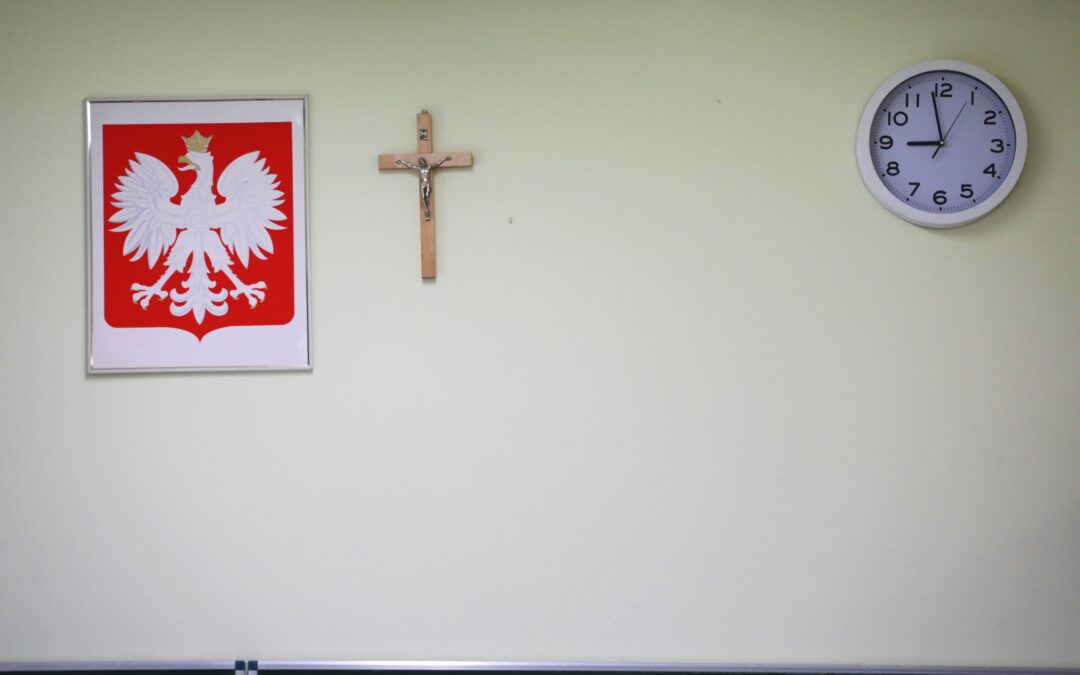Poland’s Constitutional Tribunal (TK) has issued an interim order suspending planned changes by the government to the organisation of religion classes in schools, which were due to go into effect at the start of the new school year next week.
The measure is in place while the TK considers a claim – submitted by the head of the Supreme Court at the request of the Catholic church and other Christian denominations – that the plans are unconstitutional.
Prezes Trybunału Konstytucyjnego Julia Przyłębska poinformowała, że TK wydał zabezpieczenie w stosunku do rozporządzenie minister edukacji Barbary Nowackiej. Wstrzymane rozporządzenie dotyczy zmian w organizacji lekcji religii.https://t.co/ssUq5s5vf2
— Rzeczpospolita Prawo (@RPPrawo) August 29, 2024
In Poland’s education system, religion classes usually consist of the teaching of Catholic catechism, with teachers and curriculums chosen by the church but the lessons hosted and funded by public schools. The classes are optional, but a majority (though a declining one) of Polish children attend.
Under the government’s changes, schools would be allowed to create religion classes composed of pupils from different year groups, rather than from single cohorts as was previously the case.
Last week, Poland’s dominant Catholic church and the Polish Ecumenical Council – which represents minority Christian denominations – called on the president of the Supreme Court, Małgorzata Manowska, to submit a motion to the TK asking it to verify the constitutionality of the changes.
They argued that the changes should have been discussed and agreed upon with the churches and put religion teachers at risk of losing their jobs. They also claimed that they limit access to religious education and “violate the constitutional right of parents to raise children in accordance with their beliefs”.
Sorry to interrupt your reading. The article continues below.

Notes from Poland is run by a small editorial team and published by an independent, non-profit foundation that is funded through donations from our readers. We cannot do what we do without your support.
Manowska accepted the appeal and submitted a motion to the TK requesting that the changes to the organisation of religion classes be immediately suspended. She argued that they were inconsistent with the constitution, Polish law and Poland’s concordat with the Vatican.
On Thursday, the president of the TK, Julia Przyłębska, announced that her court had issued an interim order suspending the implementation of the changes while the TK considers the case. She said that it would make a final ruling soon.
Przyłębska is a close associate of Jarosław Kaczyński, the leader of the national-conservative Law and Justice (PiS) party, which was in power until last year and enjoys close relations with the Catholic church. Manowska was also appointed to her position under the PiS government.
The new, more liberal government that took office in December – and which introduced the changes to religion classes – does not recognise Przyłębska and some other TK judges as legitimate and has previously said that it would ignore some of their rulings.
The government’s majority in parliament has approved a major overhaul of Poland’s constitutional court.
Their aim is to undo what the current ruling coalition sees as the politicisation of the court under the former PiS administration https://t.co/9xxPWAljJp
— Notes from Poland 🇵🇱 (@notesfrompoland) July 25, 2024
In response to the TK’s interim order, education minister Barbara Nowacka told broadcaster Polsat that “compliance with the rulings, judgments and ideas of the tribunal of Przyłębska may constitute a failure to act in accordance with the law”.
She added that “there was no basis” for the Catholic church to interfere in the organisation of school schedules and said that the changes made by her ministry were legal.
“It seems that the episcopate claims the right of veto [but] the episcopate cannot veto government regulations,” said Nowacka, who also claimed that the government had consulted with the church on the changes.
In addition to changing the manner in which religion classes are organised, Nowacka also intends to halve the number of hours that they are taught. She has removed grades received in the classes from students’ end-of-year averages. Both those changes have also been opposed by the Catholic church.
.@barbaraanowacka: Zabezpieczenie TK ws. religii? Julia Przyłębska nie jest źródłem prawa. Episkopat idzie do Manowskiej, by ta poszła do Przyłębskiej i Pawłowicz – nie, Eldorado się skończyło. @marcinfijolek
Całość rozmowy: https://t.co/MJogTzkeIH pic.twitter.com/C8GnP3aLNd— Graffiti_PN (@Graffiti_PN) August 30, 2024
Main image credit: Slawomir Kaminski / Agencja Wyborcza.pl

Daniel Tilles is editor-in-chief of Notes from Poland. He has written on Polish affairs for a wide range of publications, including Foreign Policy, POLITICO Europe, EUobserver and Dziennik Gazeta Prawna.



















